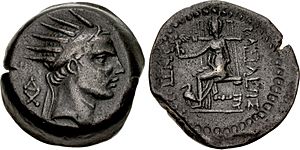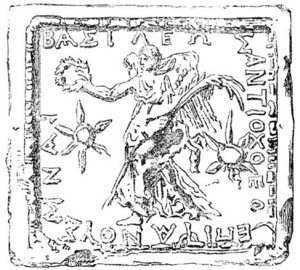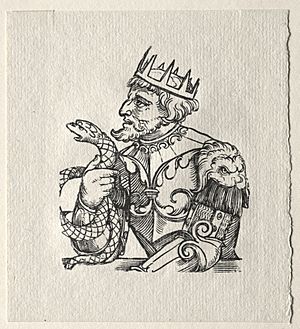Antiochus IV Epiphanes facts for kids
Quick facts for kids Antiochus IV Epiphanes |
|
|---|---|
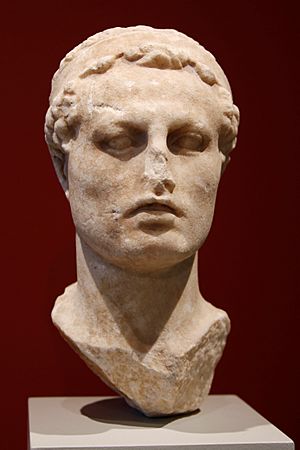
Bust of Antiochus IV at the Altes Museum in Berlin.
|
|
| Basileus of the Seleucid Empire | |
| Reign | 3 September 175 – November/December 164 BC |
| Predecessor | Antiochus, son of Seleucus IV |
| Successor | Antiochus V Eupator |
| Born | c. 215 BC |
| Died | November/December 164 BC (aged 50–51) |
| Wife |
|
| Issue |
|
| Dynasty | Seleucid |
| Father | Antiochus III the Great |
| Mother | Laodice III |
| Religion | Greek polytheism |
Antiochus IV Epiphanes was a Greek king who ruled the Seleucid Empire from 175 BC until his death in 164 BC. He was the son of King Antiochus III the Great. His original name was Mithradates, but he changed it to Antiochus when he became king.
During his rule, Antiochus IV almost took over Egypt. He also caused problems for the Jews in Judea and Samaria, which led to the rebellion of the Jewish Maccabees.
Antiochus becoming king was not simple. Many people thought he was a usurper, meaning he took the throne unfairly. After his brother Seleucus IV Philopator died in 175 BC, the rightful heir should have been Seleucus's son, Demetrius I. However, Demetrius was young and held hostage in Rome. Antiochus took this chance to declare himself king, getting support from the Greek leaders in Antioch.
His actions created problems for the Seleucid Empire later on. After Antiochus died, there were many power struggles between different family members. This fighting greatly helped the empire fall apart.
Antiochus was known for his unusual behavior. He sometimes acted strangely in public, like visiting public bathhouses or trying to get local government jobs. Because of this, some people called him Epimanes, which means "The Mad." This was a play on his official title, Epiphanes, meaning "God Manifest."
Contents
Life Story of Antiochus IV
How Antiochus Became King
Antiochus was born around 215 BC. He was a son of the Seleucid king Antiochus III the Great. As a possible future king, he was sent to the Roman Republic as a hostage in 188 BC. This was part of a peace agreement called the Treaty of Apamea.
Later, his older brother Seleucus IV Philopator became king in 187 BC. Antiochus was then exchanged for his nephew, Demetrius I Soter, who was Seleucus's son and heir. After this, Antiochus lived in Athens. He was there when his brother was killed in 175 BC.
Seleucus was killed by his government minister Heliodorus in September 175 BC. Heliodorus then tried to take control of the government. But this did not last long. With help from King Eumenes II of Pergamum, Antiochus IV traveled from Athens to Syria. He arrived by November 175 BC. Since Seleucus's rightful heir, Demetrius I Soter, was still a hostage in Rome, Antiochus took the throne for himself. He first said he would rule with another son of Seleucus, a baby named Antiochus. This young Antiochus later died in 170 BC, possibly because Antiochus IV had him killed.
Antiochus's Ruling Style
Antiochus IV wanted to be known as a generous and grand ruler. He would throw money to people in the streets of Antioch. He gave unexpected gifts to strangers. He also gave money to big projects, like the Temple of Zeus at Athens.
He held huge military parades with his Western forces at Daphne, near Antioch. He also hosted fancy parties for important people, using the best food and clothes. He even hired more soldiers for his army. All these things cost a lot of money, but the empire seemed to collect enough taxes to pay for it. His strange behavior and surprising interactions with common people led some to call him Epimanes ("The Mad"). This was a joke about his title Epiphanes ("God Manifest").
Wars with Egypt and Rome
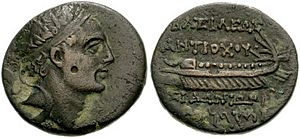
After becoming king, Antiochus made sure to stay on good terms with the Roman Republic. In 173 BC, he sent a group of officials to Rome. They brought part of the money still owed from the 188 BC Treaty of Apamea. While there, they renewed a friendship and alliance treaty with Rome. This was helped by the fact that Antiochus had come to power with the help of Eumenes II, who was Rome's main ally in that area.
In 170 BC, the people protecting the young King Ptolemy VI Philometor of Egypt demanded that a region called Coele-Syria be returned to them. They declared war on the Seleucids. They thought Antiochus's kingdom was weak after he killed his nephew. However, Antiochus knew about the attack and was ready. He had already gathered his forces. As soon as the Egyptian army left Pelusium, Antiochus IV and his Seleucid army attacked and defeated them. The Seleucids then took Pelusium, which gave them supplies and a way into Egypt.
Antiochus moved further into Egypt, conquering almost everything except Alexandria. He even captured King Ptolemy. This was possible because Rome, who was usually Egypt's ally, was busy with the Third Macedonian War. So, Rome could not get involved elsewhere.
To avoid upsetting Rome, Antiochus let Ptolemy VI continue to rule Egypt as a puppet king from Memphis. When Antiochus left, the city of Alexandria chose a new king. This was one of Ptolemy's brothers, also named Ptolemy. The two Ptolemy brothers then made peace and decided to rule Egypt together instead of fighting each other.
In 168 BC, Antiochus attacked Egypt a second time. He also sent ships to capture Cyprus. Before he reached Alexandria, a Roman ambassador named Gaius Popillius Laenas stopped him. The ambassador delivered a message from the Roman Senate. It told Antiochus to remove his armies from Egypt and Cyprus. If he did not, Rome would declare war.
Antiochus said he needed to talk to his advisors. The Roman envoy then drew a circle in the sand around Antiochus. He said, "Before you leave this circle, give me a reply that I can take back to the Roman Senate." This meant Rome would declare war if Antiochus stepped out of the circle without agreeing to leave Egypt right away. Antiochus thought about it and decided to pull back his armies. Only then did the Roman shake his hand.
Old stories say this day was a great humiliation for Antiochus IV. Some modern historians, however, think Antiochus might have been okay with it. The Roman intervention gave him an excuse to avoid a long and costly siege of Alexandria. He could return home with treasure and loot, having weakened Egypt without much risk.
Troubles with the Jews
The Seleucid kings, like the Ptolemies before them, generally respected Jewish culture. They also protected Jewish traditions in Judea. However, Antiochus IV completely changed this policy. This happened after a disagreement over who should lead the Temple in Jerusalem and be the High Priest. It might also have been after a crushed revolt.
Antiochus made laws that banned many traditional Jewish practices. He started to persecute devout Jews. For example, pigs were considered unclean by Jews. But ancient writer Diodorus wrote that Antiochus "sacrificed a great swine at the image of Moses... and sprinkled them with the blood." He also ordered that Jewish holy books be sprinkled with pig's broth. He even forced the high priest and other Jews to eat pig meat. These actions led to the Maccabean Revolt against his rule. Scholars sometimes call this time the 'Antiochene crises' for the Jews. These harsh rules were very different from how Seleucid kings usually treated local religions.
The Books of Maccabees
Local revolts against the Seleucid Empire were common, but most did not succeed. The revolt Antiochus IV caused in Judea, however, was well recorded. According to the book of 2 Maccabees, a rumor spread that Antiochus had been killed while he was fighting in Egypt. In Judea, the High Priest Jason, who had been removed from his position, gathered 1,000 soldiers. He launched a surprise attack on Jerusalem. Menelaus, the High Priest chosen by Antiochus, had to flee Jerusalem during a riot.
King Antiochus returned from Egypt in 168 BC, very angry about his defeat. He attacked Jerusalem and put Menelaus back in power. He then executed many Jews. After this, Antiochus IV made laws to help the Jews who were more pro-Greek. He outlawed Jewish religious practices. The Temple in Jerusalem was changed to a mix of Greek and Jewish worship, including the worship of Zeus. Jerusalem was attacked and looted a second time during this chaos. Antiochus built a Greek military fort called the Acra in Jerusalem. This fort was a stronghold for Greek-influenced Jews and a Greek army base. This happened between 168 and 167 BC.
Traditionally, the First and Second Books of the Maccabees describe the Maccabean Revolt as a fight against foreign political and cultural control. However, some modern historians believe Antiochus IV was actually stepping into a civil war. This was a fight between traditional Jews in the countryside and Greek-influenced Jews in Jerusalem. The revolt also led to the writing of the Book of Daniel. In this book, a villain called the "King of the North" is generally thought to be Antiochus IV. The way Antiochus is shown attacking Jerusalem and then dying influenced later Christian ideas about the Antichrist.
Antiochus's Last Years
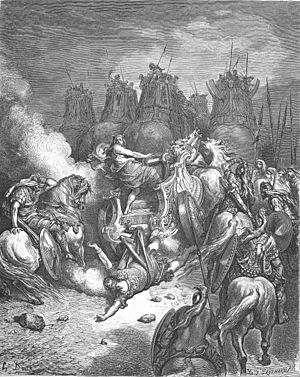
While Antiochus was busy in the west, King Mithridates I of Parthia attacked from the east. He took the city of Herat in 167 BC. This cut off the direct trade route to India, effectively splitting the Greek world in two.
Antiochus knew the danger in the east but did not want to lose control of Judea. He sent a commander named Lysias to fight the Maccabees. The King himself led the main Seleucid army against the Parthians. Antiochus had some early success in his eastern campaign. He captured King Artaxias and took back Armenia. His campaign went through Ecbatana, and he attacked Persepolis. However, the people there drove him away. On his way back home, he died in Isfahan in 164 BC.
There are different religious explanations for Antiochus IV's death. He reportedly attacked a temple of the Mesopotamian goddess Nanaya in Persia shortly before he died. Some people thought his death was a punishment from Nanaya for his disrespect. Jewish sources also said his death was because of his earlier disrespect at the Temple of Jerusalem.
According to a later Jewish text, the scroll of Antiochus (Megillat Antiochus), when Antiochus heard his army was defeated in Judea, he got on a ship and fled to coastal cities. Everywhere he went, people rebelled and called him "The Fugitive." So, he drowned himself in the sea. This story is from the 2nd century AD, much later than other accounts.
Antiochus's Legacy
In Jewish Tradition
Antiochus IV is remembered as a major villain in Jewish traditions related to Hanukkah. This includes the books of Maccabees and the "Scroll of Antiochus." Jewish religious texts call him הרשע harasha ("the wicked"). The Jewish Encyclopedia says that since both Jewish and non-Jewish sources agree on his character, their description is likely correct. They describe him as a cruel and boastful ruler who tried to force Greek culture on everyone in his empire.
However, whether Antiochus truly wanted to destroy Judaism as a culture and religion is debated. His persecution was mostly limited to Judea and Samaria. Jews living in other places were not affected. Also, Antiochus was not necessarily trying to spread Greek culture for ideological reasons. Historian Erich S. Gruen suggests he was more focused on practical things, like collecting money from Judea.
Divine Titles
Antiochus was the first Seleucid king to use divine titles on his coins. He might have been inspired by the Greek kings in Bactria who did this earlier. Or he might have built on the idea of ruler worship that his father, Antiochus the Great, had made official in the Seleucid Empire. These titles included Θεὸς Ἐπιφανής "manifest god," and, after he defeated Egypt, Νικηφόρος "bringer of victory."
How Historians See Him
Many ancient sources were against Antiochus IV, even non-Jewish ones. However, some modern historians are careful about trusting these old stories completely. The historian Polybius was a friend of Demetrius I, who did not like his uncle Antiochus. Polybius was also a bit of an elitist. So, stories about Antiochus IV having fun with common people in taverns might have made him look bad in ancient times. Modern values might not find such actions wrong. Historian Dov Gera says that Antiochus IV was a "talented and accomplished politician." He believes that the negative picture of him painted by Polybius was influenced by his friends' political views and should not be fully trusted.
See also
 In Spanish: Antíoco IV Epífanes para niños
In Spanish: Antíoco IV Epífanes para niños
- Abomination of desolation
- List of fictional Antichrists
- List of people who have been considered deities
- List of Syrian monarchs
- Timeline of Syrian history
 | Valerie Thomas |
 | Frederick McKinley Jones |
 | George Edward Alcorn Jr. |
 | Thomas Mensah |


